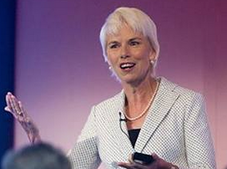 By guest blogger Jackie Farrow The numbers of women making it to the top in technology industries make rather depressing reading. While (given the traditionally male-dominated nature of jobs like programming, game development and hardware design) statistics are improving, just four Fortune 100 technology companies are run by female CEO's. That's a slightly worse percentage than the pretty dire stats for the entire Fortune 1000 list. Here we'll look at what the issues are, focusing on one of the biggest sectors of the market; gaming. The Gaming Market Women, according to an Entertainment Software Association report, make up very nearly half of regular gamers in 2014. If games companies are going to be successful in targeting a market that's half women, they are going to have to put women in positions of power, both in terms of game development and in broader areas. So what are the challenges faced by women within the industry? Success Stories The growth of the gaming industry has been rapid and sustained, and one of the fastest expanding areas has been the online casino sector. It's easy to see why; sites like River Belle offer players the chance to experience the thrills of a night at the tables without leaving home. There are plenty of women's success stories in the online casino industry itself; Casino Life magazine published an inspiring interview with five women working at a senior level in Romania last year. Harassment While there are plenty of women entering, and being successful in, the games industry, there is a continuing problem with online harassment. This is often aimed at female games developers who take any kind of stand against the sexism that's still a feature of many games. There can be no doubt that some young women are put off entering an industry that, on the surface, is becoming more and more appealing to all age groups and genders, by the regular abusive trolling of female game developers who speak out on sexism in the industry. Role Models And there's a vicious circle working here; the fewer women there are in the tech industries, the fewer role models there are for young women to look up to and seek advice from. However, they are there, and however slow progress is, there must eventually come a tipping point. Teju Deshpande, co-founder of Mindcrest, works on technology designed for law firms. In an interview with ChicagoBusiness.com she remembered the advice given to her by a female mentor when she started as an electronic engineer: "She told me, 'It's OK to be tough. Spend the hours—it won't always be like this.' " We can only hope she's right. It has been, is and still will be a long and rocky path for women in the industry and like many things changes take time. It is vital that young women are encouraged to follow their dream and are provided with any possible support in order to achieve their goal because giving up a dream is just not an option. - Jackie Farrow is currently studying journalism and is a freelance writer. (Image courtesy of Public Domain Pictures / Pixabay.com)
1 Comment
 By Shreya Shankar, Global Tech Leader College Station, TX I like free shirts. I really do. Who doesn't? The thought first struck me as I entered Rackspace HQ for my first hackathon, SOHacks. (Hackathons are competitions that last at least 24 hours, and you're expected to submit a project by the end. Your project could be a mobile app, website, or anything tech-related). Countless companies lined their own booths against the walls, giving away free shirts, stickers, food, and more. I got enough shirts to last me more than a week. It was pretty cool. I didn't know what a hackathon was like before I attended SOHacks. I was, at first, apprehensive. I'm not the best coder. I haven't developed 15 apps like some of the other kids have. I was just a beginner. But after companies such as Google, LinkedIn, and Microsoft gave me free t-shirts, water bottles and stickers, I decided that maybe the hackathon wasn't going to be so bad. As we all congregated in a large room to officially begin the hackathon, I couldn't help but notice that there were very few girls. Again, another instance where females were underrepresented. As I talked to a few of the girls, I realized that many of them hadn't taken a coding class or computer science course before. Disappointed, I began to start working with my team -- which (yay for us) had 3 girls -- to develop our projects. I quickly realized that my limited experience with seamlessly integrating APIs with my work wouldn't get me anywhere. Hour after hour passed by as my friends and I bugged literally the entire Android advising team to help us. At around 3 in the morning, we realized that we needed to come up with another idea, and we hastily came up with a website and text-messaging platform as our product (with a half hour nap in there somewhere). At the awards ceremony, I was happy to see that a few girls were part of teams that placed in the top 5. However, the majority of award winners (15 or so) were boys. I'm not hating on boys here (they created some AMAZING products), but I want to point out that we NEED more females in hackathons. After all, free shirts are pretty awesome, right?  By: Shreya Shankar, Global Tech Leader "OMG -- this is so cool! I can now make links to other pages!" she said while I was teaching her HTML. A faint smile played on my lips as I felt somewhat satisfied -- satisfied that I could help create a positive experience for middle school students through my passion for computer science. I mean, I kind of wish someone taught ME computer science when I was 11 or 12. I used Google Sites to create a personal site for myself (I won't attach any links to avoid any embarrassment for my 12-year-old self), but using Google Sites is far from coding from scratch. I'm happy to see that more middle school kids can experience hands-on programming. Now that I've actually been able to share my passion for computer science with just thirty kids, I've become addicted to the feeling of satisfaction I obtain from helping other students learn. Organizations such as Global Tech Women and the National Center for Women in Technology have inspired me to make a difference not just in my community, but the world. The spark lit up in my head a few months ago as I put the pieces together: I love computer science, there aren't enough girls in computer science, and summer vacation was (thankfully) arriving pretty soon. Just like that, I decided to start Camp Sci Girl (http://www.campscigirl.org) to close the gender gap in technology. Did you know that in 2012, only about 12% of computer science bachelor's degrees were awarded to women? We've got to change this. I've recruited over 50 mentors and participants around the world (thanks, girls) and am super excited to pilot the program in a few weeks. Make sure to check out Camp Sci Girl's twitter (http://www.twitter.com/campscigirl) to follow how we're trying to close the gender gap in technology. What are Camp Sci Girl's goals? First, I'd like to highlight the fact that Camp Sci Girl will not be anything like your average online summer school. Camp Sci Girl is trying to steer away from the dreadful stereotype of mundane summer classes that kids can take to get ahead. What we're trying to do is expose middle school girls to computer science. About 50% of female K-12 students think that computer science careers are "odd" for girls to pursue. Camp Sci Girl aims to convince girls that computer science is most definitely a viable high school, college and career path. My team of mentors and I aren't trying to cram in as much knowledge into our students as we can; we want to provide our students with a fun, new learning experience. By the end of Camp Sci Girl, I hope that our girls will realize that computer science isn't just for boys. I think my entire year would be made if a student of mine emailed me that she wanted to take programming in high school or attend a hackathon. Because really, with every additional girl that considers computer science as an option, the large gender gap in technology closes. Someday, 50% of computer science bachelor's degrees will be awarded to women. But for that to happen, we've got to step up our game and help introduce younger girls to computer science.  Rumbidzayi Mlambo, Zimbabwe Rumbidzayi Mlambo, Zimbabwe By Rumbidzayi Mlambo, Zimbabwe and Global Tech Leader Looking at myself right now I get goose bumps just by thinking of all the things I am doing, those i am about to do and those that i am planning to do. The future is filled with endless possibilities, I have the courage and confidence to pursue the things that I am passionate about that is Science, Technology Engineering and Mathematics (STEM) and how I have found myself at the intersection of these amazing disciplines. I am a finally in a space where I can innovate and dare to challenge the status quo! Let me tell you a little about myself and how I got into technology. firstly I am a mother of 6 and yes I went into labour 5 times and I have a step daughter. I was born in Kadoma a small town in Zimbabwe and grew up in Bulawayo the 2nd capital city of Zimbabwe. Growing up I was an intelligent child a book worm and a bit of a nerd. The problem was i never knew what I was going to do with my life. The careers I was exposed to were mainly teaching, nursing, medicine. All I knew was that I wanted to make a difference and I wanted to be different. Igues looking back I can say that I wanted to innovate. I did well at school got chains of A's at O'Level and when it came to advanced level I just went with the flow never thinking really of what taking up certain subjects would mean. I knew I loved Sciences and so I chose to do Sciences. I had no one to help me and my parents were just proud of their daughter excelling and could not offer much support in this unknown territory. Same thing in college no one close to me knew what I should do at University and I changed a lot and settled with Biochemistry and Chemistry. Still my thirst for Innovation was not quenched and I felt I liked everything, people thought I was just plain confused! I finished college not very inspired was pregnant by the we graduated and got married. I stayed at home and had more kids leaving my family disappointed and confused. I finally got to work at the university I attended 3 years later and thats when my journey began. I always found myself searching for solutions to problems even the non-technical ones e.g in administration, policy, management. I left my job at the University and went into Government and still found more problems in need of solving I was just amazed at the fact that no-one seemed to care and all they did was complain. I left again and went into the Research Council I figured they would be the ones researching all these problems and finding solutions to them. Still I was disappointed. I discovered the magic of Science and Technology though, through my online searches and Research. I discovered Intellectual property and knew I had to know more about how it impacts on Science and Technology (S&T). I left my job, abandoned my career, left my babies for another city to study Intellectual Property I came out more inspired and Ready to finally launch myself. I discovered a mentor in one of my former bosses who told me she had seen something in me, a burning fire which showed in my work reports and work. her name is Rungano Karimanzira, she gave me the strength to continue to discover my dreams and showed me the ropes. She was and is still always there for me pushing me to do more, listening to me sharing her experience as a woman in a male dominated field she helped me find my place and voice amongst the male counterparts, she is also a mother and that common ground helped me manage the pressures of being a wife and a mother with my career. It was through our interaction that I discovered the TechWomen programme and I tell you my life will never be the same again. through this programme in the Silicon Valley I learnt that it was ok to like a lot of things, it was possible to integrate all the things I was passionate about and raise the stakes. I discovered that I could integrate my Biosciences, Chemical Sciences and Intellectual Property, with Technology and implement my ideas better. I discovered my inspiration through two amazing women in the Valley Meredith Mckenzie (Vice President and Deputy General Counsel of Juniper Networks) my professional Mentor and Rochelle Kopp (Managing Principal of Japan Intercultural Consulting) my cultural Mentor. Technology is more than just for professionals in technology unfortunately here in Zimbabwe professions are compartmentalised and at times with very little interaction with other areas especially the natural sciences. I am now working on a health App that has the potential to transform diagnostics in Zimbabwe. With a 93% mobile penetration and abundant solar energy mobile technologies can give marginalised populations access to diagnostics which previously they had to travel to major cities to get. I am combining my Biochemical and Chemical know;ledge with mobile technology. I am now a self taught web developer with skills in coding various languages including HTML, CSS, Javascript and PHP, I am an aspiring Computer and electronics engineer. through my mentorship I have learnt that nothing is impossible. I am using my knowledge and background to showcase the intersection of knowledge and how a multidisciplinary approach to problem solving can have tremendous impact. I am co-ordinating the Technovation challenge here in Zimbabwe and soo excited to meet and talk to girls from different backgrounds about technology and telling them that it doesn't matter what you are doing you can make technology relevant for you! I have benefited from the power of mentorship and networking. I hope that we can all take time out to encourage and support young girls it can make a difference. I will be introducing you to Zimbabwe's techwomen as I write about them and what they are doing. From Global Tech Women: Rumbidzayi is a member of Global Tech Leaders and represents Zimbabwe. If you are interested in joining Rumbidzayi and other women from around the world learn more and sign up here. By Shreya Shankar, College Station, TX
About thirty computer screens brightly flashed onto the faces of young students as I entered my local middle school's computer lab. My first reaction was, "Wow, these kids have fancy computers. I don't remember having such fancy computers six years ago." But then I looked at what the kids were doing, and I was genuinely surprised. Each student was intently focused on his or her screen, learning Ruby. Well, with the exception of one kid, who was coding a website in HTML. After sitting with a couple of girls - yes, girls! - who were trying to create an animation using Ruby, I realized that these students thought coding was fun. It wasn't a task to these kids. They created simple animations for fun, just like I put puzzles together for fun when I was a middle schooler. And they treated coding just like solving a puzzle - "hey, I should probably change the angle of rotation so the animal can travel this way" or "I should probably make a loop to repeat this function three times." It made me pretty happy to see the young students in my community critically think and solve problems. The fact that there are some middle schoolers today that enjoy critical thinking restores my faith that maybe - just maybe - our generation isn't as doomed as what some people think. As I tutor some of my fellow high school students in physics and calculus, I come to realize that many students just don't feel like applying themselves to the task at hand. "Why can't I just Google the answer and move on?" is a frequently asked question during every tutoring session. I'm just afraid that the number of students who don't feel like applying themselves will grow every year. However, thankfully, most of the high schoolers I know dissect a problem when they cannot obtain the correct answer. Now that I have seen 5th and 6th graders fall in love with critical problem solving and algorithm design, I feel better about us students in general. Working with the enthusiastic middle schoolers makes me extremely glad that I fell into computer science. The more kids who apply themselves, the merrier, right? by Shreya Shankar
Global Tech Leader and High school junior, College Station, TX USA I walked into my AP Compsci classroom on the first day of my sophomore year. I was the first girl there. I was also the last girl there. Every day, I sat in a classroom full of Asian and white males who basically did math and science for a living. I won't lie -- I was very intimidated for the first few weeks, being an underclassman female and all. Surprisingly, the boys treated me like any other kid in the class. I looked up to the boys as older brothers who could teach me programming, and I came to love computer science to the point where I took up a computer science/engineering internship at Texas A&M. Things have changed quite dramatically at my high school. As I enthusiastically recommended girls to sign up for AP Compsci, more girls took the course. I never actively advocated for women in STEM classes; I just nonchalantly recommended the courses to kids who didn't know what to take. And that nonchalant recommendation was enough for girls to decide that they wanted to give computer classes a shot. Recently, I've been involved in many efforts to boost female involvement in computer science. As a National Center of Women in Technology high school representative, I've been inspired to initiate a coding club for girls at my local middle school. However, after really talking to and working with other girls, I've come to realize what exactly pulls girls away from technology classes. It's not because high schools don't make an effort to draw kids into computer courses. It's all about stereotypes. When asked why she doesn't take computer classes in high school, the average girl responds with something similar to "It's only for those geeky boys." These girls think that they would do just fine in the class if they took it. They aren't scared of the boys. They know they're good enough to take any computer class they want to. However, girls don't want to do something that's "meant for boys," just like boys don't want to take dance classes that are "meant for girls." So how do we fix this? How do we get more girls involved in computer classes? Judging from my school, I think more and more girls are starting to take computer classes because they know of girls who have taken and enjoyed computer classes. All it takes is for one girl to show the other girls that girls can code, too. Coding isn't as hard as everyone thinks it is (well....unless you're a CS major or competitively code...maybe I should talk about competition experiences later...). All in all, here's a message for all the high school girls out there -- just try compsci out. You'll like it. And, your friends will too. GTW: To find out more about Global Tech Leaders, read about its members and learn how you can join and represent your region of the world, visit the Global Tech Leaders page.  By Deanna Kosaraju, Founder of Global Tech Women Happy New Year amazing Global Tech Women! 2014 is going to be an unbelievable year filled with possibilities. As we start a brand new calendar with lots of open spaces which will quickly fill-up I would like to ask you to assess your own needs. Are you following your passion? Are you looking at the big picture or are you worried about cleaning out your inbox (or the kitty litter) after the holiday break? Read on... Based on my experience working with technical women around the globe, here are the 5 things I recommend you consider: 1. What is your definition of success? Has it changed? As we move through life our priorities change. If we are listening to that voice inside us our goals and objectives become more in-line with our true mission. We don't all aspire to be one thing -- imagine how boring life would be if this were the case! Don't listen to those outside sources that tell you there is only path and one way to get there. Not so! The most conventional thing about Global Tech Women is we are unconventional. I could bore you with my own personal trajectory here but I will spare you. 2. Look at the big picture. Be strategic, not tactical. As Zig Ziglar says, "The chief cause of failure and unhappiness is trading what you want most for what you want right now". What are your big picture goals personally and professionally? This big picture thinking allows you to prioritize the tactical. By keeping an eye on the prize it gives you laser focus. When you are asked to do something that doesn't fit your long-term objective get rid of it, it isn't serving you. I understand this is easier said than done but it takes practice. At a minimum, you are making a conscious choice to delay your goals for this very important reason. Life happens. Just don't sign up for things without clearly understanding why you are doing it. If it is to please others, think twice. 3. Do you have the right tools to succeed? I cannot tell you the number of women I have met who let their skills become antiquated and found themselves losing key projects, promotions, or even worse, their jobs. I know you are busy but only you can lookout for your future and this is part of that big picture thinking that must happen. Look at your resume or LinkedIn profile. Type into a job search site your most highly prized skills...is it RPG? In my zip code there are only two job openings for an RPG programmer (shocked there are two - if you weren't around in the 80's you probably don't know what RPG is - ignore). Python has 384 positions. Get a fresh perspective and ask a recruiter you trust their opinion of your current skill-set and experience given your goals. You need to know how relevant your skills now and in the long-term. Need speaking skills? Sign up for Toastmasters. Need project management certification, start now. You get the gist. 4. Ask for help. Many women have a problem asking for help. They are trained as an egg to be Wonder Woman. Don't do this. Once you know where you are going and what you need --- ASK!!! This is why Global Tech Women exists. Our mission is to create a "global network of inspired, connected and self-actualized women". This means you. We can help. If we can't, we know someone who can. Join our Facebook group, sign-up for our newsletter, sign-up for the global virtual conference Voices, join our LinkedIn group or just email me. Our mission is to serve you. 5. Surround yourself with those who believe in you and your mission and will go to battle for you. I learned this one very late in my life. I always thought I could survive in any climate -- but why??? You need to surround yourself with people you trust, respect and share the same values you do. That doesn't mean they will always agree with you, that isn't what I am saying. It needs to be someone who is willing to give you their opinion. They are willing to open their brains, hearts and connections to help you get there. If you are not around people like this you need to set a new path and find them. Life is too short to hangout with the wrong people. They should lift you up, not drag you down. Having the right people around will not only help you reach your goals but you will have much more fun getting there. I hope this is useful. Did I miss something? What would you like to add from your personal experience? Tell us what your passion is. ASK FOR HELP! I look forward to sharing ideas and conversations with you in 2014. Happy New Year Global Tech Women. I am so honored we are connected. by Deanna Kosaraju, Founder of Global Tech Women As we close out 2013 let's look back at the year in review. If you have been out of the loop on these topics, you should join the Global Tech Women Facebook Group! Here are the top 5 topics of conversation for women in tech around the globe based on community posts:  1. Sheryl Sandberg and the book Lean In. In 2013 a stream of voices came to light both for and against Sandberg's premise that women should "lean in" and take control of their careers. The most incendiary comments have come from Anne Marie Slaughter in a number of places, the latest entitled "Why the Lean In Conversation Isn't Enough". The article "Feminism’s Tipping Point: Who Wins from Leaning in?" by former Facebook engineer Kate Losse, spurred the most comments and debate in the GTW (Global Tech Women) Community. "Sandberg assumes that the feminist question is simply, how can I be a more successful worker?" GTW made Lean In a Book Club selection in 2013 - check out the recording, review articles and join the discussion.  2. Marissa Mayer, the CEO of Yahoo. What a lightning rod this woman has become! First, she made the decision to ban all workers from working at home while she built a nursery in her office. Taking a 2-week maternity leave, she created a stir of debate here at GTW - is this good or bad for women in tech? Then, she extends maternity benefits for all employees - men and women. Finally, her stack ranking of workers is causing many employees to be shown the door - on a quarterly basis. And who can forget the comment made during a shareholders meeting to Ms. Mayer, "I'm George Polis. I have 2,000 shares of Yahoo. I'm Greek, and I'm a dirty old man, and you look attractive, Marissa." Despite your opinion on Ms. Mayer, she will continue to be a beacon for women executives in tech --- good and bad.  3. The year of the female tech entrepreneur. Globally, the focus on women in start-ups and as entrepreneurs has increased substantially in 2013! This has been GREAT news for the GTW community. Here are a few of the many articles posted on the Global Tech Women Facebook group: Turkey: Nilufer Durak: From Corporate America to a Tech Startup in Turkey US: Limor Fried: The Maker Movement Bangalore, India: Bangalore Women Kick-Starting Their Lives as Bosses Cape Town, South Africa: Female African Leaders Make Pledge At Inaugural African Women's Conference Indonesia: GEPI Sets Up Angel Investor Network in Indonesia with Female Entrepreneurs in Mind Canada: Cross-border program gives women in tech a boost Eastern Europe: Burgeoning start-up accelerators Australia: Australia ranks as world's No. 2 for women entrepreneurs Chile: Growing women in tech start-up community Plus many others. This continues to be a trend for 2014 and we will continue to bring you the latest.  4. Tech Conferences and the lack of and degrading comments made towards women. Outrage at a Microsoft gaming event when a woman was matched with a man on stage and told "she played like a girl" then told "...just let it happen. It will be over soon" creating outrage by women's groups. Worldwide Developers Conference in San Francisco (see photo) - a picture says a thousand words. A guy's take on women at a security conference created quite a stir from the comments posted on his blog. To end the year with a start-up conference and an app called Titstare and the unbelievable tweets by Pax Dickson reminds us of the worst aspects in the culture of tech. Australia's 20 top business leaders signed a pledge to ban all-male panels from their conferences. Australia is working nationally to address the issue here and in other areas we will discuss at this years Voices Conference.  5. The numbers of Women on Boards. Globally, the number of women on Boards is going up. But this Fall, the pending IPO of Twitter created a stir when Vivek Wadwha called them out. Vivek Wadhwa blasted Twitter CEO Dick Costello for not having women on its Board at IPO calling him and all of Silicon Valley sexist. Costello fought back calling Wadwha "the Carrot Top of Academia". Next thing we know we are talking about 8 other IPO's without women. It appears Wadwha won this argument as Twitter announced a female board member a few weeks ago. Companies about to go public are on notice...we are watching. Obviously, there were many more issues than the 5 above. The new CEO of GM, lack of female VC's, low percentages of funding for female start-ups, the growing number of organizations focused on increasing the numbers of girls in tech, etc...Did we get your top 5? What would you add?
Wishing you an amazing 2014. We hope you will stay connected to Global Tech Women throughout the year. We are here for you and would love to hear your thoughts on how we can do better.  As many of you know, I spend way too much of my time in the ballet world. My daughter Maya is one of the most passionate dancers I have seen during the last 8 years of her life twirling and leaping everywhere she goes. Needless to say, the idea of attending So You Think You Can Dance at the Warfield in San Francisco last night was yet another event to grin and watch Maya's enjoyment while I wished I was relaxing at home after a busy week. I was so wrong. Ballet is about precision and it is about being the right "type". Ballerinas are between 62 and 67 inches, they weigh next to nothing, they look a certain way; they move a certain way. Deviate from this way and you are not considered "serious" about dance. We (as ballet moms) watch our daughters go through puberty, their growth and body type change and it is not something that can be controlled - genetics kicks in. They grow into beautiful and amazing women but the ballet community begins to reject the ones they used to embrace as unable to be professional dancers. Why am I telling you this? It got me thinking about women in tech. We look at those women who have "made it" as leaders in technology. They are a certain type. Typically born of privilege, the right schools, the right "look", the right mannerisms. I know, I have spent more time with them than I have with the ballerinas. But here I was, at So You Think You Can Dance. My favorite dancer, Jasmine, is nearly 6 feet tall at 70 inches, she towers over her partner, she doesn't look like a "ballerina" although her technique is clearly ballet but she has this style I have never seen before in a dancer. She has taken dance and made it her own. I began to look at the other dancers and sure enough, most of these dancers would never be in professional ballet but they were better than most ballet performances I have seen. My point. We need to take our love of technology and make it our own. We need to find a stage where we can be what we are passionate about and we will shine. The research shows that if you can't see it, you can't be it. It is time we start showcasing women who embody the love of technology in their own way so that we can embrace our own trajectories. Let's face it, not all of us want to be the executive of a multi-national tech company and even if we do, we don't want to assume "the look" of those who are already there. So, thank you Maya for dragging me to this show. And thank you Jasmine for reminding me of a very important lesson. We all deserve to be where we thrive, we just need to find it. That is what Global Tech Women is all about.  A recent article in the Deccan Herald features a discussion by senior women in Bangalore on the state of women in technology in India. Despite the numbers of women in tech, often quoted as high as 30% in industry in many verticals, only 7-8% of women are in executive leadership roles (or less). Cisco Director of Software Development Pallavi Arora is quoted saying it is "partly due to an “aspirational deficit” among women, unlike men." REALLY??? I nearly choked on my chai reading this. I have worked with Pallavi in the past and this sounds like these words are taken out of context (if said at all) so I believe this journalist may have misquoted her, but here it is, in print. Do you agree? Do Indian women in tech lack the ambition to land an office in the executive suite? Based on my years of working with women in tech in India I think this notion is ridiculous. Technical women in India are more ambitious and driven than anywhere else I have travelled in the world and I have blogged about this more than once. Many of my meetings with Indian women in tech occurred late into the night (i.e. 10:30 pm I get calls) as they were leaving the office! I regularly observed women leaving their offices at 10-11pm every night! So where is the disconnect here? I have seen this argument before:
Yes, these are real quotes, said to me, from real HR people responsible for diversity, an executive of a multi-national, and the head of an Indian association who actively works in the women in tech space! So as you can see, this quote in the Deccan is in line with what I have been told privately. So, let's blame the women. This is an easy way to shift the blame, to remove the discussion of real problems women in tech in India face which are much more complex to solve. What are these problems? My thoughts based on my experience on the ground: Let's start with the statistic that industry loses 50% of their technical women in india every 5 years. Not quoted in the Deccan and an important statistic. Why? Because the challenges for women in tech change over time: 1. Lack of role models. Most women in tech today have a mother who did not work outside the home. Their mother in-law (if they are married) also didn't work outside the home. Their husband has never experienced living with a working woman (for the most part) and the matriarchs have an expectation that all the things they did should apply to the younger working woman. Fresh meals, child rearing, running the household are the cultural imperative for many. The pressure to perform at home is larger than many of us outside of India can imagine. 2. Lack of reliable child care. There is little formal or licensed childcare available to working families. Many couples move to the cities for their work and cut their community ties where childcare from family members would be available. Childcare is a HUGE problem in many places in India. Children are often left with uneducated and untrained household help. Rumors of incidents with household help mistreating children (and even having them begging in the streets during the day for example) has led to a level of anxiety of working mother finds difficult, if not impossible to overcome. 3. Sexist male managers. The stories I could talk about here would make your hair curl. The level of discrimination by mid-level male managers is shocking. These men have no idea how to work with women in the office and they see them as fair game. Sexual harassment, discrimination and not following company policies on paid-leave and flexible hours is rampant. 4. Company productivity is still measured by the amount of time your butt is in the seat. Many companies in India measure productivity by the amount of time you are in the office. Many still measure the access card scans of when you arrive and leave the office. This is a huge disadvantage for women. The most productive workers are penalized for this measurement - and many of them are women. Flexibility is still often perceived as a way for women to take advantage. Now is the time to rethink how an organization measures success. 5. Infrastructure problems. Electricity, bandwidth, traffic and lack of conveniences. Everything is a battle. Regular reliable access to the Internet and the unbelievable time spent on commuting work hand in hand. Government needs to take an active role in improving infrastructure in India's cities. Try driving in Bangalore, Hyderabad or Delhi at 8am on a Tuesday. You will see what I mean. (I know - I am dreaming on this one). Those are my top 5. The pressure to walk away from tech revolve around these and many other challenges we could talk about here. This pressure erodes the ambition of many women who can't see the way out. Family and societal pressures drown ambition. If women don't "marry well" they are in an environment that does not support them. Let's not blame them as having an "aspiration deficit". I wish the article in the Deccan would have talked about these things. But these things are hard. I look forward to having a real conversation about how we can get more women in executive positions in tech. It has happened in banking, finance and other industries so we know it is possible but let's be real. The culture of technology is sexist in India and it must be addressed. |
|


 RSS Feed
RSS Feed